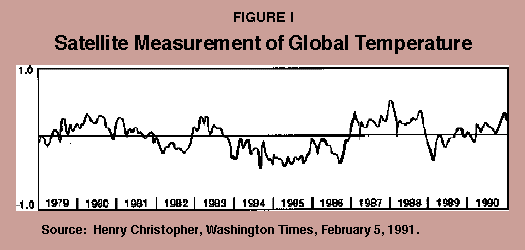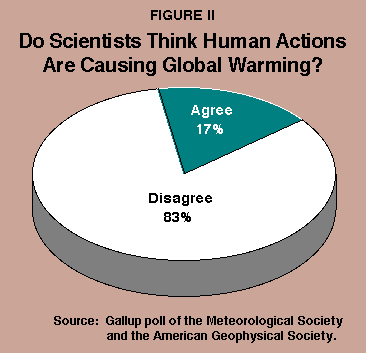MYTHS OF GLOBAL WARMING
Global Warming is a much publicised subject currently concerning many people. A United Nations summit in Kyoto Japan last December addressed this so-called threat to mankind. The President of the United States has committed himself to finalizing a treaty that would impose legally binding, internationally enforceable limits on the production of greenhouse gases, primarily carbon dioxide (CO2). That decision was based on the belief that global warming is significant, that humans are its primary cause and that only immediate government action can avert disaster. It is now stated that President Clinton will use Executive Privilege to implement the United Nations environmental agenda.
There is no scientific consensus that global warming is a problem, or that humans are its cause. Even if current predictions of global warming are correct, delaying drastic government actions by up to 25 years will make little difference to global temperature 100 years from now. Proposed treaty restrictions would produce little environmental good but great economic harm. In contrast, postponing action until we have sound evidence that human activity is causing global warming, and better technology to mitigate the problem, makes environmental and economical good sense.
Much proposed environmental policy is based on myths. Let's look at the four most common.
Myth #1: Scientists Agree the Earth is Warming. While ground-level temperature measurements suggest the earth has warmed between 0.3 and 0.6 degrees Celsius since 1850, global satellite data, the most reliable of all climate measurements, shows no evidence of warming during the past 18 years.

Even if earth's temperature has increased slightly, the increase is well within the natural range of known temperature variation over the last several thousand years. Indeed, the earth experienced greater warming between the 10th and 15th centuries — a time when vineyards thrived in England and Vikings colonised Greenland and built settlements in Canada.
Myth #2: Humans Are Causing Global Warming. Scientists do not agree that human activity measurably affects global climate. The evidence supporting this theory is weak. Most scientific experts directly concerned with climate thoroughly reject the theory.
A Gallup poll found that only 17 percent of the members of the Meteorological Society and the American Geophysical Society think that the warming of the 20th century has been a result of greenhouse gas emissions — principally CO2 from burning fossil fuels.
Only 13 percent of the scientists responding to a survey conducted by the environmental organization Greenpeace believe catastrophic climate change will result from continuing current patterns of energy use. More than 100 noted scientists, including the former president of the National Academy of Sciences, signed a letter declaring that costly actions to reduce greenhouse gases are NOT justified by the best available evidence. While atmospheric carbon dioxide has increased by 28 percent over the past 150 years, human-generated carbon dioxide could have played only a small part in any warming, since most of the warming occurred prior to 1940 — before most human-caused carbon dioxide emissions. Myth #3: The Government Must Act Now to Halt Global Warming. Underlying this myth is the belief that the consequences of inaction could be catastrophic, and prudence demands immediate government action.
However, a 1995 analysis by proponents of global warming theory concluded that the world's governments can delay acting up to 25 years with no measurable disadvantage to the environment. T.M.L. Wigley, R. Richels and J.A. Edmonds followed the common scientific assumption that a realistic goal for global warming policy would be to stabilize the concentration of atmospheric CO2 at approximately twice preindustrial levels, or 550 parts per million by volume. Given that economic growth will continue with a concomitant rise in greenhouse gas emissions, the scientists agreed that stabilization at this level is environmentally sound as well as politically and economically feasible. They concluded:-
In short, policymakers need not act in haste and ignorance. The government has time to gather more data, and industry has time to devise new ways of reducing greenhouse gas emissions.
- Governments can cut emissions to approximately 9 billion tons per year now, or wait until 2020 and cut emissions by 12 billion tons per year.
- Either scenario would result in the desired CO2 concentration of 550 parts per million.
- Delaying action until 2020 would yield an insignificant temperature rise of 0.2 degrees Celsius by 2100.
Myth # 4: Human-Caused Global Warming Will Cause Cataclysmic Environmental Problems. Proponents of the theory of human-caused global warming argue that it is causing and will continue to cause all manner of environmental catastrophes, including higher ocean levels and increased hurricane activity. Reputable scientists, including those working on the Intergovernmental Panel on Climate Change (IPCC), the United Nations organization created to study the causes and effects of global climate warming, reject these beliefs.
Sea levels are rising around the globe, though not uniformly. In fact, sea levels have been rising for thousands of years — far predating any possible human impact.
Periodic media reports link human-caused climate changes to more frequent tropical cyclones or more intense hurricanes. Tropical storms depend on warm ocean surface temperatures (at least 26 degrees Celsius) and an unlimited supply of moisture. Therefore, they reason, global warming leads to increased ocean surface temperatures, a greater uptake of moisture and destructive hurricanes. But recent data shows no increase in the number or severity of tropical storms, and the latest climate models suggest earlier models making such connections were simplistic and inaccurate.
Since the 1940s the National Oceanographic and Meteorological Laboratory has documented a decrease in both the intensity and number of hurricanes. From 1991 through 1995, relatively few hurricanes occurred, even the unusually intense 1995 hurricane season did not reverse the downward trend. The 1996 IPCC report on climate change found a worldwide significant increase in tropical storms unlikely; some regions may experience increased activity while others will see fewer, less severe storms. Since factors other than ocean temperature such as wind speeds at various altitudes seem to play a larger role than scientists previously understood, most agree that any regional changes in hurricane activity will continue to occur against a backdrop of large yearly natural variations. What about other effects of warming? If a slight atmospheric warming occurred, it would primarily affect nighttime temperatures, lessening the number of frosty nights and extending the growing season. Thus some scientists think a global warming trend would be an agricultural boon. Moreover, historically warm periods have been the most conducive to life. Earth's plant life once thrived in a much warmer, carbon dioxide-filled atmosphere.
Taking all the evidence into account, it is clear there is local warming, but overall, the planet has cooled over the past twenty years. The claimed 'global warming' is not due to mankind but to volcanoes and other natural phenomena. It is estimated that humans have contributed about two percent to some local warming and many scientists are now exposing the myths of global warming. So rather than legislating in haste and ignorance then repenting at leisure, governments should maintain rational policies, based on scientific fact and new technologies. And they would do so were it not for the hidden agenda underlying the myth of global warming.
See Sydney Morning Herald Report — "When It Comes to Global Warming, Just Cool It".
The powers that be are using this myth in the Hegelian Dialectic.THESIS (initial problem) ANTITHESIS (opposition to the problem) SYNTHESIS (solution to the problem)
The process will result in the loss of freedom, "after all we need controls for our own protection". Control through consensus.
References:- The True State of the Planet, edited by Ron Bailey (1995); Science Under Siege, Michael Fumento (1993); National Center for Policy Analysis Report on Environment Policy, H. Sterling Burnett green.htm
back
